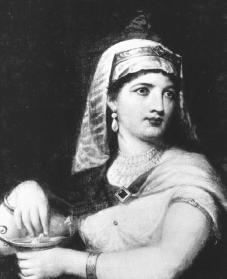
Cleopatra VII, who ruled from 51 to 30 BC, was the intelligent and politically incisive pharaoh who was born to Ptolemy XII and possibly Cleopatra V. Historians believe that she had three sisters and two younger brothers, Ptolemy XIII and Ptolemy XIV, both of which she married. By the time Cleopatra became ruler in 51 BC, her family had ruled Egypt for 251 years; Cleopatra would also be the last ruler of Egypt. During her reign she earned a less than desirable reputation, but as the lover of the Roman emperors Julius Caesar and Mark Antony, Cleopatra would go down in history as a romantic fable.
Cleopatra ruled with her father at age 19, and much like those that ruled before him, Ptolemy XII's court was plagued with violence and corruption. Cleopatra learned her political lessons from her father as she watched his embarrassing efforts to uphold the throne of Egypt through the buying of support from the powerful Romans. However, soon after doing this her father died, leaving the throne in the hands of his children, Cleopatra and her brother Ptolemy XIII. The conditions and orders were that she should marry the elder of her two brothers, which she did, and it was clear that she was the dominant, controlling force in that relationship and it was during this time that Cleopatra was driven from Egypt in 48 BC.
Despite being exiled from Egypt, Cleopatra made preparations to return to Egypt by force. But when Julius Caesar arrived in Alexandria subsequent to the Battle of Pharsalus, she perceived an opportunity to use him. It was during this process that her brother Ptolemy XIII died while fighting Caesar, which restored the throne to Cleopatra and her other brother Ptolemy XIV. The relationship between Caesar and Cleopatra, which grew from their mutual to desire for power and money, resulted in an affair in which Cleopatra bore him one son. Cleopatra longed for power in Rome, while Caesar wanted riches found in Cleopatra's court which made for an ideal association.
Based on these two covets, power and money, they came to an agreement that pleased the both of them in which he placed Cleopatra on the throne of Egypt as his mistress, while ensuring her that Egypt would not be captured by Rome. He also made certain that since he had no sons, he would choose someone from Cleopatra's own line of family to eventually become the heir of both Egypt and Rome. However, when she later went to visit him in Rome between 47 and 44 BC, she discovered that he had been assassinated under mysterious circumstances. It is commonly believed that Cleopatra herself poisoned him and it was after this that she made her son Caesarion her partner on the throne. (Silverman 38) Just as promised, the heir was chosen from her own family.
Cleopatra then summoned a meeting at Tarsus with Mark Anthony in the winter of 41 and 40 BC. It was during this time that he established a relationship with Cleopatra and because of this relationship he sent his wife Octavia to Italy with the excuse that she was pregnant. As he began to focus on planning a ritualistic marriage and making final preparations for the invasion in Parthia, his priorities changed to focusing on Cleopatra’s pregnancy. She gave birth to twins; a boy and a girl who were named Alexander Helios and Cleopatra Selene. The struggle for power between Antony and Octavian, Caesar’s heir, came to a head at Actium on the west coast of Greece on the afternoon of September 2, 31 BC with a battle at sea, when for some unknown reason Antony broke off the engagement and sailed for the open sea after Cleopatra’s ships. In spite of this, the changes in precedence caused the failure of his Parthian campaign, but Cleopatra in return supplied him with financial help that was greatly needed.
Cleopatra spent her life watching the struggle of outside forces, first Pompey against Caesar, and then the assassins of Caesar against his avenger, Antony, and then Antony against Caesar's great nephew, the future Augustus. Her will was unquenchable and opportunistic; as a ruler she was a failure, and as a military ally to Antony, a disaster. (Silverman 41)The flight of sixty Egyptian ships under Cleopatra’s command from the decisive battle of Actium not only reduced Antony’s fleet, but in their impulsive desire to get back to Egypt, broke the battle line.
It was during this campaign in the Battle of Actium that was a turning point which caused disaster for the Egyptians. Anthony and Cleopatra fled to Egypt, and Cleopatra retired to her mausoleum as Anthony went off to fight his last battle. Receiving false news that Cleopatra had died, Anthony fell on his sword. (Clayton 216) Cleopatra then buried Anthony and committed suicide. Though the means of her death remain uncertain, it is commonly believed that she went into her tomb with a basket of figs that contained asps, which were a symbol of divine royalty. The poisonous venom caused her to die at age 39 after being pharaoh for 22 years and as was their wish, Anthony and Cleopatra were buried together. Although her beauty has been fabled in literature, Cleopatra was above all things a very clever, intelligent and political woman; she had to be to captivate two such men as Caesar and Antony and endeavor to use them to preserve her kingdom. This marked the end of Egypt's last queen's reign, which left behind a legacy that will never be forgotten.
Clayton, Peter A. Chronicle of the Pharaohs: New York: Thames and Hudson Ltd., 1994.
Silverman, David P. Ancient Egypt. New York: Oxford University Press, 1997.
No comments:
Post a Comment